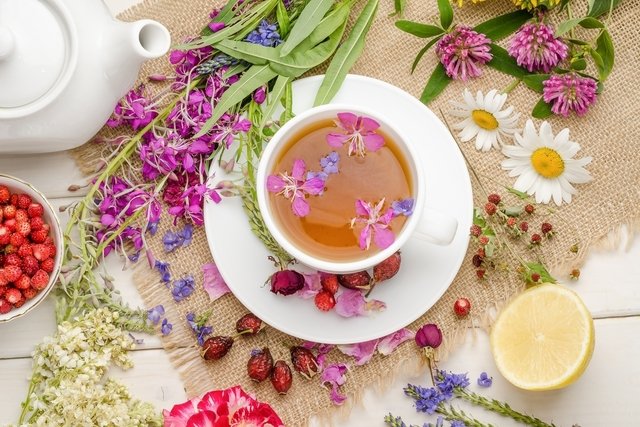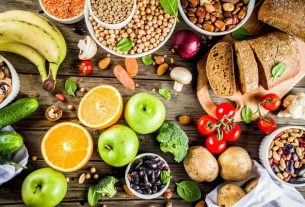Some teas, such as boldo, fennel, mint, green tea and macela, have stimulating, calming and digestive properties, making them a good homemade solution to improve digestion and combat excess gas.
Poor digestion is a situation that can arise due to situations such as consuming very fatty foods or drinking a lot of liquids during a meal, for example, causing a feeling of bloated belly, frequent belching, abdominal discomfort and nausea.
However, when poor digestion persists even after using the teas or in the presence of symptoms such as weight loss, blood in the stool or difficulty swallowing, it is advisable to consult a gastroenterologist or general practitioner to identify the cause of poor digestion and recommend treatment with medication, if necessary.

1. Boldo tea
Boldo tea is an excellent way to alleviate poor digestion after very large or fatty meals, as boldo is a medicinal plant that stimulates the liver to metabolize fats, making them smaller and easier to digest, relieving the symptoms of indigestion.
Ingredients:
- 1 teaspoon of fresh chopped boldo leaves;
- 150 mL of boiling water.
Preparation mode:
Place the boldo leaves in the boiling water, cover and let it rest for around 10 minutes. Strain and drink when symptoms appear or 10 minutes after meals to prevent symptoms of poor digestion from appearing.
2. Fennel tea
Fennel is a plant that has properties that stimulate the production of digestive enzymes, helping with digestion and relieving symptoms of bloating, stomach discomfort or frequent burping, for example.
Ingredients:
- 1 teaspoon of fennel seeds;
- 1 cup (tea) of boiling water.
Preparation mode:
Place the spoonful of fennel in a cup of boiling water, cover and let it rest for 10 minutes. Drink after meals when symptoms of poor digestion appear.
3. Peppermint tea
Peppermint tea has a digestive and antispasmodic action, improving the digestive process and relieving cramps that may arise due to the accumulation of intestinal gases.
Ingredients:
Preparation mode:
Place peppermint leaves in boiling water. Cover and let rest for 10 minutes and then strain the mixture. Drink before meals and 10 minutes after, to prevent or alleviate the emergence of symptoms.
4. Thyme and pennyroyal tea
A good tea for poor digestion is thyme with pennyroyal. This home remedy for poor digestion is effective because these medicinal plants have properties that help digest food, achieving great results in a short time.
Ingredients:
- 1 cup of boiling water;
- 1 teaspoon of thyme;
- 1 teaspoon of pennyroyal;
- 1/2 teaspoon of honey.
Preparation mode:
Add the thyme and pennyroyal to the cup of boiling water. Cover and let rest for about 3 to 5 minutes. Then strain and drink 1 cup of this tea whenever symptoms of poor digestion are present.
5. Macela tea
An excellent home treatment for poor digestion is to drink macela tea daily because it has calming and digestive properties that are effective in combating indigestion. Discover all the benefits of macela tea.
Ingredients:
- 1 teaspoon (0.5 to 1.5 g) of dried marcela flowers;
- 1 cup (tea) of water.
Preparation mode:
To prepare this home remedy, simply add the macela flowers to boiling water, cover and let it rest for 5 minutes. Strain and drink afterwards. For treatment, it is recommended to drink this tea up to 3 times a day.
6. Green tea with mint
Green tea with mint is a great homemade solution to aid digestion because it stimulates the production of stomach acids, making it a great home remedy option for those who have a full stomach and suffer from frequent burping.
Ingredients:
- 1 teaspoon of dried mint leaves;
- 1 cup of boiling water;
- 1 teaspoon of green tea leaves.
Preparation mode:
Add the mint and green tea leaves to the cup of boiling water, cover and let it rest for about 5 minutes. Filter and drink afterwards, without sweetening because sugar makes digestion difficult.
7. Herbal tea
A good tea to improve digestion is fennel tea with espinheira santa and boldo because they have properties that help with food digestion and cleanse the liver, taking effect quickly.
Ingredients:
- 1 liter of water;
- 10 g of boldo leaves;
- 10 g of espinheira santa leaves;
- 10 g of fennel seeds.
Preparation mode:
Boil the water, remove from the heat and then add the herbs. Cover the pan or kettle, let it rest for 10 minutes and strain. Drink 1 cup of this tea up to 4 times a day.
In addition to drinking this tea, it is important to know how to combine foods well with each other, because consuming foods rich in fiber and foods rich in fat in the same meal is one of the main causes of poor digestion. A good tip is when having a “heavy” meal, such as feijoada or barbecue, for example, to eat a small amount of food and for dessert, prefer fruit instead of sweets.
Find out more about teas to combat gas and alleviate poor digestion:
Bibliography
- LORENZO, S, Jose et al. Understanding the potential benefits of thyme and its derived products for food industry and consumer health: From extraction of value-added compounds to the evaluation of bioaccessibility, bioavailability, anti-inflammatory, and antimicrobial activities. Critical Reviwes in Food Science and Nutrition. Vol.59. 18.ed; 2879-2895 , 2019
- SINGH, Upma et al. Chemical constituents and pharmacological properties of anise seeds (Pimpinella anisum L.). International Journal of Environment and Health Sciences. Vol.3. 3.ed; 33-37, 2021
- SINGLE HEALTH SYSTEM (SUS). Guide to Florianópolis Medicinal Plants. 2019. Available at: <https://docs.bvsalud.org/biblioref/2020/10/1122249/guia-de-plantas-medicinais-de-florianopolis.pdf>. Accessed on 01 Sep 2023
- CORDEIRO, M, F.; et al. Phytochemical characterization and biological activities of Plectranthus barbatus Andrews. Brazilian Journal of Biology. 82. 1-12, 2020
- FEDERAL UNIVERSITY OF SANTA CATARINA. HU/CCS’s didactic garden of medicinal plants: fennel. Available at: <https://hortodidatico.ufsc.br/erva-doce/>. Accessed on 01 Sep 2023
- HEALTH DEPARTMENT OF RIO GRANDE DO SUL. Manual on medicinal plants of the Intersectoral Policy on Medicinal Plants and Phytotherapeutics of Rio Grande do Sul . 2021. Available at: <https://saude.rs.gov.br/upload/arquivos/202112/23154715-cartilha-das-pm-da-pipmf-projeto-aplpmfito-rs-2021.pdf>. Accessed on 01 Sep 2023
- NATIONAL HEALTH SURVEILLANCE AGENCY – ANVISA. Phytotherapeutic form: Brazilian pharmacopoeia 2nd edition. 2021. Available at: <https://www.gov.br/anvisa/pt-br/assuntos/farmacopeia/formulario-fitoterapico/arquivos/2021-fffb2-final-c-capa2.pdf>. Accessed on 01 Sep 2023
- MAHBOUBI, Mohaddese. Mentha spicata L. essential oil, phytochemistry and its effectiveness in flatulence. Journal of Traditional and Complementary Medicine. Vol.11. 2.ed; 75–81, 2021

Sign up for our newsletter and stay up to date with exclusive news
that can transform your routine!
Warning: Undefined array key "title" in /home/storelat/public_html/wp-content/plugins/link-whisper-premium/templates/frontend/related-posts.php on line 12
Warning: Undefined array key "title_tag" in /home/storelat/public_html/wp-content/plugins/link-whisper-premium/templates/frontend/related-posts.php on line 13




